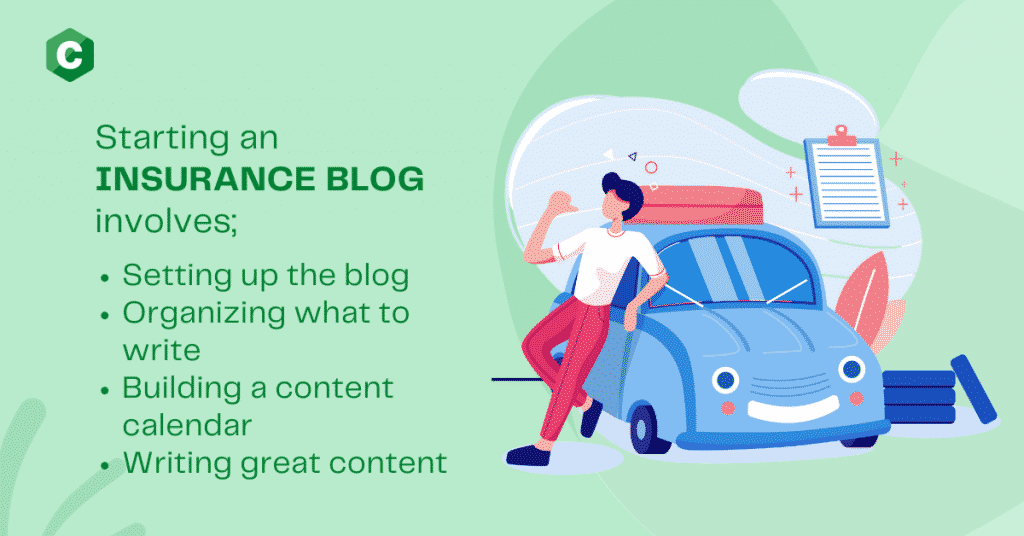Nobody knows what tomorrow and the future hold as both extraordinary and catastrophic events are possible. The best way to protect ourselves and our loved ones from devastating events is by getting insurance. Insurance is an arrangement between two parties; an insurer promises to protect the insured against a possible eventuality like illness, death, or damage. Before we look at insurance blog topics, here are some benefits of having insurance;
- Offering family support during medical emergencies – The unprecedented financial risk brought to a family during a medical emergency can be reduced by having medical insurance, which will help sort the medical bills.
- Provides financial security for businesses – By insuring businesses, one is sure of keeping a business afloat in case of anything.
- Offers peace of mind and the ability to shift risks – One can take calculated risks, and if it fails, there is a way of redeeming oneself.
There are different types of insurance including;
- Life insurance. It offers a sum of money paid after a set time or upon the insured person’s death to selected beneficiaries.
- Health insurance. It covers the entire or part of an insured person’s hospitalization costs, medicine costs, and consultation fees arising due to illness.
- Property insurance. It covers one’s home and the possessions inside it. Property insurance covers theft of house property, damage through fires, or required repairs and replacements.
- Motor insurance. It’s insurance for private cars, trucks, motorcycles, and public vehicles. It provides protection against physical damage resulting from accidents as well as theft.
Insurance Blog Topics
As a beginner blogger in the insurance niche, you should understand coming up with insurance blog topics can be challenging due to the vastness of the niche and its evolving nature. That’s why some bloggers opt to use blog writing services to ease their load. However, through this blog post, I look forward to simplifying methods of coming up with insurance blog topics. The following outlined methods explain how you can up with the topics;
1. Question & Answer Features
These types of blogs are fast and easy to create. They are simple and easy for a reader to understand as they break down big pieces of information into small bits. This blog type seeks to give answers to questions asked by readers on insurance. Also, the Q & A feature has a significant SEO impact. According to Dan Steiner, CEO of Elite legal marketing, ‘Search engines view sites that give satisfying answers as more valuable.’ Insurance blog topics that insurance bloggers can explore under this feature include;
- Q & A on the Different Types of Insurance
- Insurance Benefits Q & A
- Q & A on Insurance Policies
2. Interviews With Clients
Interviewing clients allows you to get information on their insurance experience and their perspective. This brings out the human touch aspect as a reader is able to feel connected with the interviewee. The interviewee’s stories also act as testimonials that guide readers in their decision-making process. Similarly, interviews help diversify a website’s content and help bloggers expand their networks and their audience as the interviewees will share the blog with friends and families. The following are insurance blog topics from interviewing clients;
- An Interview With a Medical Insurance Beneficiary
- An Insurance Explainer Interview
- An Interview With a Property Insurer
3. Features from Independent Insurance Representatives
Independent insurance representatives sell insurance policies offered by different insurance companies. Featuring them on the insurance website will provide readers with better options to look through before getting an insurance package. Insurance blog topics under this category include;
- 5 Essential Advice By an Insurance Representative
- Step by Step Method of Getting an Insurance
- Why Choose Insurer Y Instead of Insurer H
4. Blog Posts and Opinions from Guests
Guests can range from insurance customers, insurance company representatives, and insurance consultants who will offer knowledge on the insurance industry. Examples of insurance blog topics from this category include;
- Insurance Advice by a Customer
- Why You Should Choose Our Insurance Company
- Differences Between Property and Medical Insurance

5. Communicate Interesting Tips Important in The Insurance World
The following category includes tips that are essential in the insurance industry. You can develop insurance blog topics to educate readers and increase their insurance knowledge by explaining things they need to know. Examples of such blog topics are;
- What to Consider Before Buying an Insurance
- Critical Elements of an Insurance Policy
- 6 Best Insurance Tips For Millennials
6. How to Guides On Complex Processes In The Insurance Sector
In this category, as a blogger, you will be simplifying complex processes and jargon in the industry for the reader to understand. Examples of insurance blog topics here include;
- How to Manage Complexity In Insurance
- How to Go About When Managing Complex Insurance Claims
- Starting an Insurance Company
7. Public Events and Holidays
This category entails writing blog posts about events and holidays linked to insurance. In fact, it can be described as a seasonal category as the audience will look forward to reading these articles on the specific day of the events and holidays. Also, when readers are looking forward to the content you will write in the current year, they will be interested to find out what was written in the past year. Topics under it include;
- When is National Insurance Awareness Day
- The History of National Insurance Day
- Top 5 Global Insurance Events
8. Repurposing Popular Competitor Content
We can define popular content as content that suits the general public’s taste and understanding. Content in this category is general knowledge and not entirely specific. There are several topics that are common with almost every insurance blog, thus, for you to stand out as a beginner blogger, you’ll need to repurpose the content and give it a new perspective. This category entails topics like;
- Benefits of Insurance
- Challenges Facing the Insurance Industry
- The Evolution of Insurance
9. Infographics and Other Related Visual Content
These are visual representations of information, data, or knowledge intended to present information quickly. Infographics and visual content are vital to a blogger because they appealingly present information, quickly grab a reader’s attention, and make it easier for the audience to understand a piece of information. Insurance blog topics under this category include;

- 10 Insurance Infographics Ideas
- How to a Visual Representation of Insurance Data
- Infographics on Top 5 Insurance Trends
10. Podcasts On The Topics
A podcast is an audio file recording on specific topic discussions made available for downloading or listening via the internet. Creating podcasts on insurance topics can help you interact with the audience differently as they can hear your voice. Also, writing about podcasts that deal with the insurance industry will help you build trust with your audience. You could also receive shoutouts from the podcasters, which will help you grow your blog audience. Podcast topics include;
- 5 best insurance podcasts
- How to start an insurance podcast
- A podcast on the insurance industry
11. Skyscraper Style Content
This is a strategy that involves finding popular content with loads of backlinks, replicating it, and creating even better content. Once you’ve done this, you reach out to the people linking to the original piece of content and ask them to link to yours instead. Therefore, if you share this content with the right people, it will improve your website’s traffic through organic search. Topics under this category include;
- Writing Insurance Blogs Using Brian Deans Template
- Top 5 Insurance Blogs
- How to become an Insurance blog writer
How to Start an Insurance Blog
We learn through making mistakes, but thoroughly learning how to start an insurance blog will help you make the right decisions as a blogger and take the necessary steps that will help build your website into a high-performing and successful one. Below are steps to follow when creating an insurance blog;
Setting up the blog
Your insurance blog topics will need a home to host them. The first step to getting them home is by choosing a web host.
Choosing a web host
Web hosting is the process of buying or leasing space to house a website on the internet. You need to consider some factors before choosing a web host. They include;
Identifying your website needs – You’ll need a web host to support the platforms and building tools needed to create your desired website. For instance, if you’re creating an insurance website with an online payment method, you’ll need a web host to accommodate the payment method.
Uptime – A web host that offers top-notch availability is essential. The lack of availability may result in a link taking a long time to open when readers want to read its contents which may discourage your readers from visiting again.
Available storage – Depending on the various media forms you’ll be using, you will require storage for them. Therefore, choosing a web host with ample storage will be necessary for long-term planning.
Data security – Choosing a host that will protect your data and website as well as constantly offer backup is a crucial factor when choosing a hosting platform.
Costs and customer service are also factors to be considered.
Purchasing and connecting a domain name
A domain name is essential in a blog post-setup process as it’s what people will type on search engines to get directed to your website. A domain name plays a vital role in the success and identity of a blog. You should choose a domain name related to your brand’s reputation, and that is easy to pronounce and remember. The price of domain names ranges between $10 – $15 and depends on the extension used and where the domain name is purchased.
Choosing a blog platform
You will need a blogging platform that you can easily set up and use without difficulty. Any insurance blogger can use; WordPress, Medium, Blogger, Weebly, and Wix.
Choosing a theme or design
When choosing the theme for an insurance blog, one should aim at, simple page responsiveness; especially when the traffic increases, a color that represents the brand, and one’s budget.
Organizing what to write
It’s great to be an organized blogger. This will help you come up with great ideas, plan ahead and even remain consistent. As you organize what to write, there are some factors that you need to consider as you select insurance blog topics. These include;
Dates and holidays – topics can be derived from actual dates prominent in the insurance industry; for instance, June 28th, which is National Insurance Awareness Day, is a worldwide celebration.
Emerging trends – Change is inevitable. When a trend starts up in the insurance sector, blogging about it is an excellent opportunity to demonstrate your authority.
Investment opportunities – The insurance sector also brings with it opportunities for investment, and readers will be keen to understand how they can invest. Therefore, this is a great area you can explore for content.
Legislature – in the insurance sector, legislations are the laws that regulate the industry. Staying up-to-date with laws being enacted and writing about them will do well for you as a blogger.
How to Brainstorm Quality Content and Topics
The following are tips that you can use when brainstorming quality content and insurance blog topics;
Researching – When you carry out your research, you are able to go through previously written content and identify gaps that have yet to be covered which you can then write about. You could also use this research to repurpose popular content from your perspective.
Use topic mind maps – A mind map is a diagram that lays out information visually. As a blogger, you can break down mind maps and present the information in an article.
Creating a swipe file– This is a physical or digital location where one can store their ideas. A swipe file can be instrumental for re-visitation when you run out of ideas.
Using keywords – Carrying out keyword research can help give you ideas on what to write as well as help you identify topics that you could easily rank for.
Building out a content calendar
A content plan will act as a framework for your insurance blog. It consists of research dates, writing, reviewing and editing data, and publishing dates and times. Creating one will help you stay disciplined, focused, and consistent in creating insurance content that will help you achieve your long-term goals. Popular content calendar tools include;
Google calendars – It helps create events, tasks, and reminders.
Hubspot – It’s best when organizing digital marketing content.
Loomly – This allows you to organize posting schedules for the blog’s contents.
Trello – It’s an organizational tool that helps with team collaborations.
Writing top-notch content
Writing top-notch content will help your blog rank higher on search engines and, in return, increase traffic to your website. Therefore, when creating content, it’s essential to write blog posts that capture the reader’s attention and inspire them to take any action suggested. The following are critical points for killer blog content;
Choosing a relevant title – This is what will trigger your audience to open the link.
Outlining your article – A blog post should have; an introduction, a body, divided into different sub-sections, and a conclusion.
Keyword research – This is the process of finding specific words relevant to the insurance sector that often appear on search engines.
Adding images – A picture is worth a thousand words. The use of images that add meaning to the article will help improve the quality of the content.

Importance of insurance blogs
Several benefits emerge from starting an insurance blog. They include;
Monetization
An insurance blog can help you make money through advertisements on the blog, sponsored posts, becoming an affiliate marketer, as well as selling your branded merchandise.
Network Expansion
Blogging will enable you to meet different people in the insurance sector. These meetings will more often than not prove to be beneficial to you.
Search Engines
Through search engine optimization, your insurance blog has better chances of ranking higher on search engines and in return, increasing traffic to your website. Organic search traffic is among the many ways a website’s content gets discovered. It can be increased through link building and structuring content with targeted keywords.
Trust Building and Site Traffic
Trust-building grows between the reader and the blogger through consistent quality content generation. The correlation between this and site traffic is as simple as, ‘the more they trust you, the more they’ll visit’. These visits then increase the more you generate high-quality content and fulfill your customers’ expectations.
Curating a Library of Content
As a beginner insurance blogger, you can get by with posting weekly or bi-weekly. This is a good frequency that will help you create a good amount of content over time. However, as we’ve mentioned before, the more you post, the higher your chances of ranking. This will also help you curate a library of content that will be great for your website.
Attracting leads
On top of incorporating SEO practices, there are various ways of attracting leads. These are such as;
Creating shareable content. Ensure your audience on social media as well as your email subscribers know when you publish new content. Create shareable links.
Writing Tips
The following 8 tips will help you as a writer when working on insurance blog topics.
Selecting a topic
There are thousands of topics to work on in a specific niche. Therefore, you need to choose a particular topic to set the ball rolling.
Understanding your audience
Knowing the target audience for the blog is very important during writing. It will help you know what you need to research, their average focus length, which will determine the word count for your article, and the language to use as a blog full of jargon won’t be relatable to an audience that is not specialists in a topic.
Research
This is another important tip beginner writers should embrace. Researching will help you know more about similar content other bloggers have worked on, and through this, you will be able to find your unique angle of expressing your blog ideas.
Selection of keywords
Every blog needs keywords for SEO. Selecting keywords will help bloggers understand where and how to use their articles. Also, although it’s important to choose keywords with high volume searches, the ones with low volume searches offer an opportunity to explore them.
Title selection
This will attract your target audience to open your blogs. When selecting a title, ensure you use one that’s catchy and captivating. Remember also to use your main keyword in the title.
Outlining and building each section
The sections and subsections of an article are what make it. It’s important to clearly outline them to ensure all the important points in each part are not missed but clearly articulated.
Writing and Editing
Writing is very important, but reading and editing are also crucial. It advised that a writer should write the first edit in one sitting. Then go through the article, read it aloud, and edit it by writing. This is where the magic happens.
Setting targets
Target setting is important as it guides you as you work to meet the writing and publishing set times.

Conclusion
Although coming up with insurance blog topics can be a challenge, once you find the niche you are interested in and thoroughly follow the steps highlighted by this post, you’ll be on the right path to achieving great success for your website, ranking highly on Google as well as making money from your blog.

